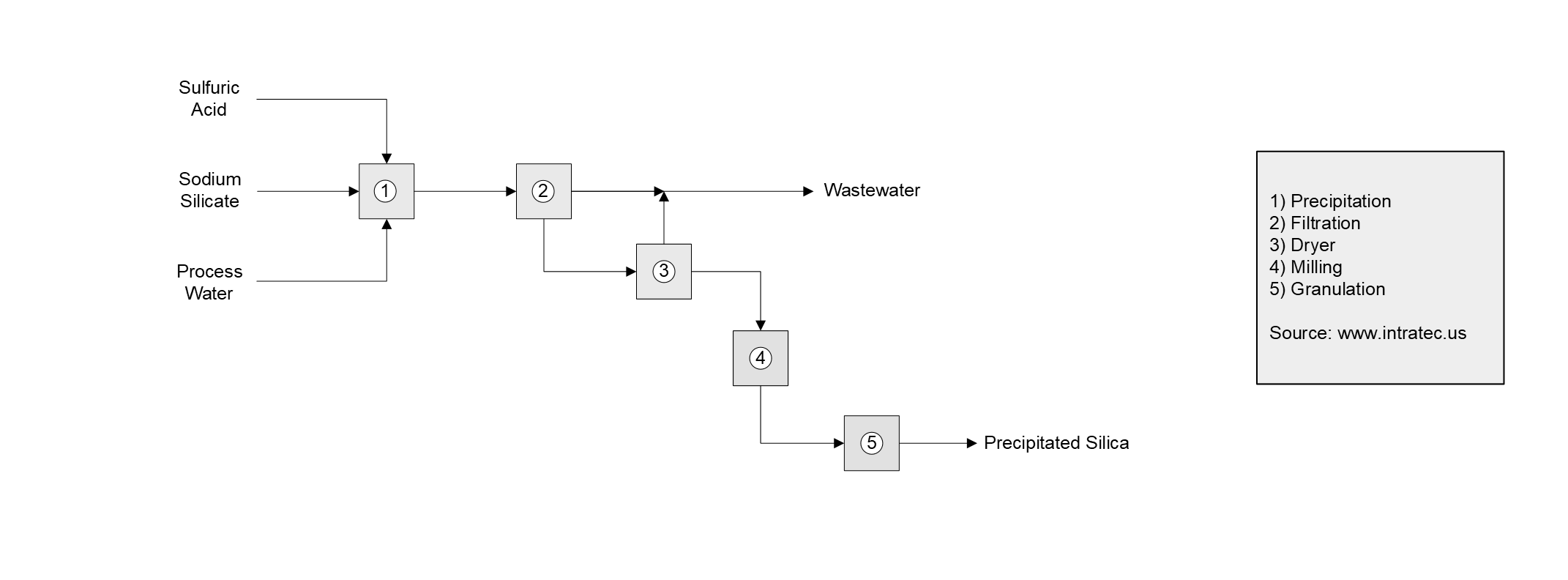Commodity Production Costs Report
Precipitated Silica Production
Silicon Dioxide Operating Costs & Plant Construction Costs
This report presents the economics of Precipitated Silica production from a sodium silicate solution and sulfuric acid in the United States. In the process, the sodium silicate solution is treated with sulfuric acid. The solution is precipitated, filtered, washed, and dried, producing Precipitated Silica.
The report provides a comprehensive study of Silicon Dioxide production and related Silicon Dioxide production cost, covering three key aspects: a complete description of the Silicon Dioxide production process examined; an in-depth analysis of the related Silicon Dioxide plant capital cost (Capex); and an evaluation of the respective Silicon Dioxide plant operating costs (Opex).
The Silicon Dioxide production process description includes a block flow diagram (BFD), an overview of the industrial site installations, detailing both the process unit and the necessary infrastructure, process consumption figures and comprehensive process flow diagrams (PFD). The Silicon Dioxide plant capital cost analysis breaks down the Capex by plant cost (i.e., ISBL, OSBL and Contingency); owner's cost; working capital; and costs incurred during industrial plant commissioning and start-up. The Silicon Dioxide plant operating costs analysis covers operating expenses, including variable costs like raw materials and utilities, and fixed costs such as maintenance, labor, and depreciation.
Key reference(s): ?

The process under analysis comprises two major sections: (1) Precipitation & Drying; and (2) Finishing.
Precipitation & Drying. Initially, sulfuric acid, hot water and the sodium silicate solution are fed to a tank equipped with a stirring system. Under agitation, the silica gradually precipitates to the extent that further precipitation of oligomeric silica occurs, discrete particles are formed, leading to a decrease in viscosity. The temperature of the reaction media is controlled in order to avoid formation of gel. The reaction product, containing a silica suspension, is fed to a rotary vacuum filter for separation of the Silica from the reaction mixture and washing out the salts contained in the filter cake. The solid content of the filter cake is about 20 wt%. The filter cake is then conveyed to a rotary dryer where remaining water is removed from the Precipitated Silica.
Finishing. The dried product is milled in jet mills and classified to control the desired fineness of the Precipitated Silica particles. Subsequently, the Silica is fed to a drum granulator to produce a dust-free Precipitated Silica product and reduce the volume for transport. Finally, the product is packed in bags and then sent to warehouses at the facility’s Outside Battery Limits (OSBL) to be stored.
Report in PDF Format
Download & Explore Anytime
Access in Various Devices
Print & Read Comfortably
Share With Co-workers
Up-to-date Report
Professional report based on Q3 2024 economic data, ensuring timely evaluations.
Multiple Use Cases
Ideal for investment screening, feasibility studies, cost estimates, and research planning.
Proven Methodology
Developed using a consistent methodology honed over a decade, ensuring reliable cost analyses.
Report Editions
Content Highlights
Plant Capital Cost Summary
Summary outlining the capital cost required for building the Silicon Dioxide production plant examined.
Plant Capital Cost Details
Detailing of fixed capital (ISBL, OSBL & Owner’s Cost), working capital and additional capital requirements.
Plant Cost Breakdowns
Breakdown of Silicon Dioxide process unit (ISBL) costs and infrastructure (OSBL) costs; plant cost breakdown per discipline.
Operating Costs Summary
Summary presenting the operating variable costs and the total operating cost of the Silicon Dioxide production plant studied.
Operating Cost Details
Detailing of utilities costs, operating fixed costs and depreciation.
Plant Capacity Assessment
Comparative analysis of capital investment and operating costs for different Silicon Dioxide plant capacities.
Production Process Information
Block Flow Diagram, descriptions of process unit (ISBL) and site infrastructure (OSBL).
Process Consumptions
Raw materials and utilities consumption figures, by-products credits, labor requirements
Process Diagrams
Process flow diagrams (PFD), equipment list and industrial site configuration
Could Not Find the Report You Need?
Obtain a Bespoke Report
Get a report targeting the process in which you are interested
See Offer Details
Understand Bespoke Reports and how you can easily order them
Check Editions & Pricing
Complete a brief form and see a quotation for your Bespoke Report
Other Related Production Cost Reports

Phosphoric Acid from Phosphate Rock (Thermal Process)
This report presents the economics of an integrated process for the production of Phosphoric Acid from phosphate rock involving: (1) the production of elemental phosphorus from phosphate rock; and (2) the production of Phosphoric Acid from elemental phosphorus via a thermal process. The final product obtained in this process is Phosphoric Acid containing 54 wt% of P2O5. The economic analysis performed is based on a plant constructed in the United States.
Details: 250 kta United States-based plant | Q3 2024 | 107 pages | Issue D | From $1,199 USD
+800 Reports Developed, Targeting +250 Commodities
Vast Report Library
858 independent and up-to-date reports examining embryonic and established production processes.
Free Sample Reports
Quickly understand the structure and depth of content of our professional reports.

